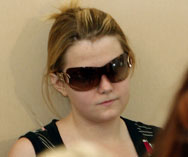Ms. Kampusch spent most of her teenage years in the tiny,
windowless cell and only made her escape when her kidnapper,
Wolfgang Priklopil, was distracted by a phone call as she was
cleaning his car in the driveway of his home.
"There are many
people who abuse one's trust, and this is very grave," said Ms.
Kampusch.
"I haven't quite found out for myself how to define
friendship."
The story of her dash to freedom, but also her relationship
to Mr. Priklopil, with whom she occasionally went shopping and
skiing, held media audiences spellbound around the globe.
"What he did to me has become more distant, (but) it does not
fade away, it boils up again and again," said Ms. Kampusch.
"I just try and handle these memories as well as I can, and
try to work through them."
Ms. Kampusch has been busy catching up on her education,
learning how to drive and reintegrating in society. She stresses
the importance of privacy for emotional issues.
"You will rarely, or even never, see me crying, sobbing or
breaking down in public. I'll sort that out in private," she
said.
Ms. Kampusch explained why she bade farewell to Mr.
Priklopil's coffin after his suicide.
"I said farewell, and why shouldn't I have done so?
"It was important to me, because the last time I saw him
alive was when he turned his back to me and I ran away head over
heels, but I only said farewell to his coffin, I didn't actually
see him," she told ORF.
After her escape, Ms. Kampusch found herself chased by
photographers and journalists and has received offers for film
and book rights from Austria and abroad.
Ms. Kampusch's mother, who is divorced from her father,
launched an emotional book about her own eight years without
Natascha earlier this month.
But so far Ms. Kampusch, who flew to Spain for the ORF
television special and spent the first day of her trip at the
seaside, has given only a small number of interviews.
She has shielded herself behind an army of psychiatrists,
media advisers and lawyers marketing and handling her case.
